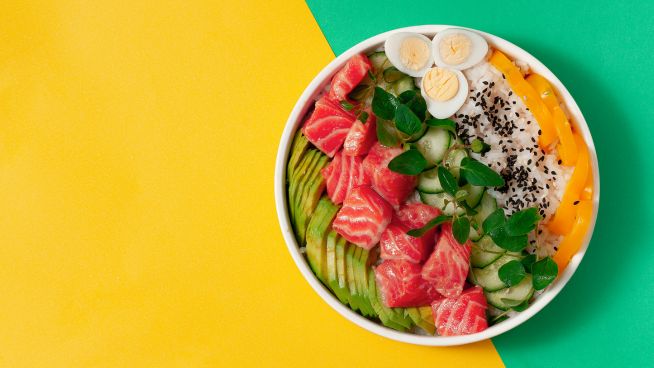Quality sleep is essential for overall health and recovery, especially regarding fitness and maintaining an active lifestyle. For the body to repair and regenerate, sleep is essential. It is crucial in cognitive function, mood regulation, and immune support. Optimizing your sleep can be significantly impacted by the foods you consume. Here are some of the best foods to improve sleep and help your body maximize recovery.
1. Tart Cherries and Cherry Juice
Tart cherries, particularly in the form of tart cherry juice, are well-known for their sleep-enhancing qualities. They are a natural source of melatonin. This hormone regulates sleep and wake cycles. Tart cherry juice is an excellent pre-bedtime choice because it improves sleep quality and duration. In addition to melatonin, tart cherries contain antioxidants that help reduce inflammation and oxidative stress, essential for muscle recovery and overall health.
How to Consume: Drink one glass of tart cherry juice in the evening or add fresh or dried tart cherries to your yogurt, oatmeal, or smoothie.
2. Kiwi
Kiwi is another fruit that can significantly enhance your sleep quality. It is rich in serotonin, a neurotransmitter that helps regulate sleep and mood. Kiwi is also high in antioxidants like vitamins C and E. They reduce inflammation and improve immune function, aiding in faster recovery from workouts. A study found that people who ate one to two kiwis an hour or two before bedtime improved sleep quality.
How to Consume: Enjoy two kiwis an hour before bed, either on their own or mixed into a fruit salad.
3. Almonds
Almonds are packed with magnesium, a mineral critical in promoting sleep by reducing inflammation, lowering cortisol levels, and regulating neurotransmitters that help calm the body. Magnesium deficiency is linked to sleep disturbances, so incorporating magnesium-rich foods like almonds into your diet can enhance sleep quality. Additionally, almonds contain protein and healthy fats that stabilize blood sugar, preventing nighttime awakenings.
How to Consume: Snack on a handful of almonds, add them to your salads, or spread almond butter on whole-grain toast.
4. Walnuts
Walnuts are an excellent source of melatonin and healthy omega-3 fatty acids, enhancing sleep quality and overall brain function. Omega-3s reduce inflammation, aiding muscle recovery and cardiovascular health. Eating walnuts before bed helps boost melatonin, leading to better and faster sleep.
How to Consume: Add walnuts to your evening snack, sprinkle them on salads, or mix them into yogurt.
5. Bananas
Bananas are high in potassium and magnesium. Both help relax muscles and promote a good night’s sleep. Bananas also contain some tryptophan- an amino acid that converts into serotonin and melatonin in the brain, aiding in sleep regulation. The carbohydrates in bananas can also help transport tryptophan to the brain more effectively, enhancing its sleep-promoting effects.
How to Consume: Eat a banana before bed on its own, blend it into a smoothie, or pair it with almond butter for added magnesium.
6. Chamomile Tea
Chamomile tea is a popular and highly used due to its calming effects. It contains an antioxidant called apigenin. It binds to specific receptors in your brain that promote sleepiness and reduce insomnia. Chamomile tea also helps reduce anxiety and inflammation, making it a perfect evening drink for promoting sleep and relaxation, aiding overall recovery.
How to Consume: Brew a cup of chamomile tea about 30 minutes before bedtime to help wind down.
7. Oats
Oats are a high source of melatonin and complex carbohydrates, which can stimulate insulin production and help tryptophan enter the brain. They also contain magnesium, potassium, and calcium, all aiding muscle relaxation and sleep promotion. Including oats in your evening snack or as part of your dinner can enhance your sleep and overall recovery.
How to Consume: Enjoy a bowl of oatmeal for dinner or a bedtime snack, adding sleep-promoting ingredients like almond milk, bananas, or walnuts.
8. Fatty Fish
Fatty fish like salmon and sardines are high in omega-3 fatty acids and vitamin D. Both have been linked to improved sleep quality. Omega-3s reduce inflammation, improve heart health, and boost serotonin production, which can enhance sleep. Vitamin D helps regulate sleep and can improve sleep duration and quality.
How to Consume: Include fatty fish in your dinner meals a few times a week for the best benefits.
9. Milk
Milk contains tryptophan and melatonin, perfect to help promote sleep. It is also rich in calcium, which allows the body to use tryptophan to manufacture melatonin. Warm milk is an old-fashioned traditional remedy used to induce sleep for generations, and its protein content also helps stabilize blood sugar, preventing sleep interruptions.
How to Consume: Warm a glass of milk before bedtime or add it to oatmeal or a smoothie for added benefits.
10. Turkey
Turkey is high in tryptophan, which helps increase the production of serotonin and melatonin. Eating turkey can promote sleepiness and relaxation, making it an excellent protein choice for dinner. Turkey also provides high-quality protein that aids in muscle repair and growth, further supporting recovery.
How to Consume: Include turkey in your evening meal or as a light snack before bedtime.
Tips for Optimizing Sleep and Recovery Through Nutrition
- Limit Caffeine and Alcohol: Caffeine can interfere with your sleep cycle, while alcohol, although it may make you sleepy, disrupts the quality of sleep. Avoid these substances, especially in the evening.
- Stay Hydrated: Hydration is essential for cellular recovery but try to reduce fluid intake two hours before bed to avoid waking up frequently at night.
- Create a Consistent Sleep Routine: Combine a nutrient-rich diet with a regular sleep schedule to maximize sleep quality and recovery. Aim to go to bed and wake up simultaneously every day.
Nutrition improves sleep quality and supports the body’s recovery processes. Incorporating sleep-promoting foods into your diet can enhance your overall health, reduce inflammation, and optimize recovery, leading to better performance in all aspects of life.
Check out my book Eat to Win for weeks of nutritional plans for breakfast, lunch and dinner. And Blended Bliss if you love smoothies!
Check out my INSTANT STRENGTH book for total strength, speed, and power programs.
To maximize stability, mobility, and flexibility, check out my book, THE BALANCED BODY.
To see great exercises, methods, and techniques videos, subscribe to my YouTube channel, BALANCED BODY.
RECOMMENDED FOR YOU
MOST POPULAR
Quality sleep is essential for overall health and recovery, especially regarding fitness and maintaining an active lifestyle. For the body to repair and regenerate, sleep is essential. It is crucial in cognitive function, mood regulation, and immune support. Optimizing your sleep can be significantly impacted by the foods you consume. Here are some of the best foods to improve sleep and help your body maximize recovery.
1. Tart Cherries and Cherry Juice
Tart cherries, particularly in the form of tart cherry juice, are well-known for their sleep-enhancing qualities. They are a natural source of melatonin. This hormone regulates sleep and wake cycles. Tart cherry juice is an excellent pre-bedtime choice because it improves sleep quality and duration. In addition to melatonin, tart cherries contain antioxidants that help reduce inflammation and oxidative stress, essential for muscle recovery and overall health.
How to Consume: Drink one glass of tart cherry juice in the evening or add fresh or dried tart cherries to your yogurt, oatmeal, or smoothie.
2. Kiwi
Kiwi is another fruit that can significantly enhance your sleep quality. It is rich in serotonin, a neurotransmitter that helps regulate sleep and mood. Kiwi is also high in antioxidants like vitamins C and E. They reduce inflammation and improve immune function, aiding in faster recovery from workouts. A study found that people who ate one to two kiwis an hour or two before bedtime improved sleep quality.
How to Consume: Enjoy two kiwis an hour before bed, either on their own or mixed into a fruit salad.
3. Almonds
Almonds are packed with magnesium, a mineral critical in promoting sleep by reducing inflammation, lowering cortisol levels, and regulating neurotransmitters that help calm the body. Magnesium deficiency is linked to sleep disturbances, so incorporating magnesium-rich foods like almonds into your diet can enhance sleep quality. Additionally, almonds contain protein and healthy fats that stabilize blood sugar, preventing nighttime awakenings.
How to Consume: Snack on a handful of almonds, add them to your salads, or spread almond butter on whole-grain toast.
4. Walnuts
Walnuts are an excellent source of melatonin and healthy omega-3 fatty acids, enhancing sleep quality and overall brain function. Omega-3s reduce inflammation, aiding muscle recovery and cardiovascular health. Eating walnuts before bed helps boost melatonin, leading to better and faster sleep.
How to Consume: Add walnuts to your evening snack, sprinkle them on salads, or mix them into yogurt.
5. Bananas
Bananas are high in potassium and magnesium. Both help relax muscles and promote a good night’s sleep. Bananas also contain some tryptophan- an amino acid that converts into serotonin and melatonin in the brain, aiding in sleep regulation. The carbohydrates in bananas can also help transport tryptophan to the brain more effectively, enhancing its sleep-promoting effects.
How to Consume: Eat a banana before bed on its own, blend it into a smoothie, or pair it with almond butter for added magnesium.
6. Chamomile Tea
Chamomile tea is a popular and highly used due to its calming effects. It contains an antioxidant called apigenin. It binds to specific receptors in your brain that promote sleepiness and reduce insomnia. Chamomile tea also helps reduce anxiety and inflammation, making it a perfect evening drink for promoting sleep and relaxation, aiding overall recovery.
How to Consume: Brew a cup of chamomile tea about 30 minutes before bedtime to help wind down.
7. Oats
Oats are a high source of melatonin and complex carbohydrates, which can stimulate insulin production and help tryptophan enter the brain. They also contain magnesium, potassium, and calcium, all aiding muscle relaxation and sleep promotion. Including oats in your evening snack or as part of your dinner can enhance your sleep and overall recovery.
How to Consume: Enjoy a bowl of oatmeal for dinner or a bedtime snack, adding sleep-promoting ingredients like almond milk, bananas, or walnuts.
8. Fatty Fish
Fatty fish like salmon and sardines are high in omega-3 fatty acids and vitamin D. Both have been linked to improved sleep quality. Omega-3s reduce inflammation, improve heart health, and boost serotonin production, which can enhance sleep. Vitamin D helps regulate sleep and can improve sleep duration and quality.
How to Consume: Include fatty fish in your dinner meals a few times a week for the best benefits.
9. Milk
Milk contains tryptophan and melatonin, perfect to help promote sleep. It is also rich in calcium, which allows the body to use tryptophan to manufacture melatonin. Warm milk is an old-fashioned traditional remedy used to induce sleep for generations, and its protein content also helps stabilize blood sugar, preventing sleep interruptions.
How to Consume: Warm a glass of milk before bedtime or add it to oatmeal or a smoothie for added benefits.
10. Turkey
Turkey is high in tryptophan, which helps increase the production of serotonin and melatonin. Eating turkey can promote sleepiness and relaxation, making it an excellent protein choice for dinner. Turkey also provides high-quality protein that aids in muscle repair and growth, further supporting recovery.
How to Consume: Include turkey in your evening meal or as a light snack before bedtime.
Tips for Optimizing Sleep and Recovery Through Nutrition
- Limit Caffeine and Alcohol: Caffeine can interfere with your sleep cycle, while alcohol, although it may make you sleepy, disrupts the quality of sleep. Avoid these substances, especially in the evening.
- Stay Hydrated: Hydration is essential for cellular recovery but try to reduce fluid intake two hours before bed to avoid waking up frequently at night.
- Create a Consistent Sleep Routine: Combine a nutrient-rich diet with a regular sleep schedule to maximize sleep quality and recovery. Aim to go to bed and wake up simultaneously every day.
Nutrition improves sleep quality and supports the body’s recovery processes. Incorporating sleep-promoting foods into your diet can enhance your overall health, reduce inflammation, and optimize recovery, leading to better performance in all aspects of life.
Check out my book Eat to Win for weeks of nutritional plans for breakfast, lunch and dinner. And Blended Bliss if you love smoothies!
Check out my INSTANT STRENGTH book for total strength, speed, and power programs.
To maximize stability, mobility, and flexibility, check out my book, THE BALANCED BODY.
To see great exercises, methods, and techniques videos, subscribe to my YouTube channel, BALANCED BODY.










